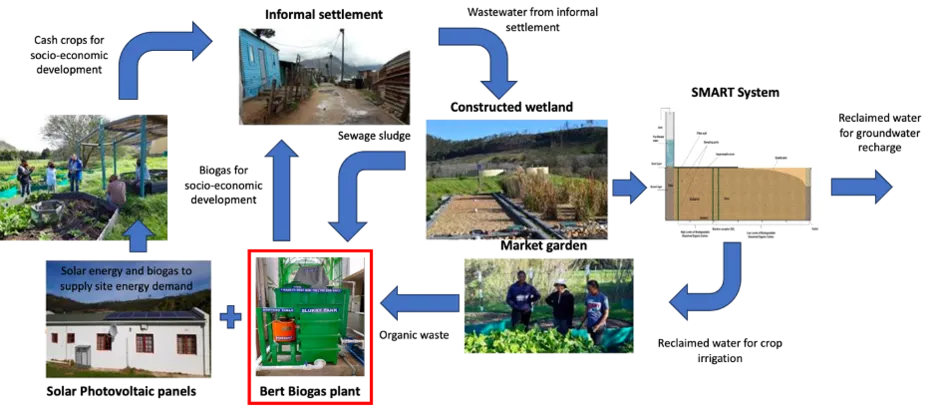Nexus Hub
Integrated Water-Energy-Food (WEF) Nexus Project, Western Cape, South Africa

This prefeasibility study will apply an integrated Water-Energy-Food (WEF) Nexus approach to examine appropriate nature-based technologies that can expand the scope of the current activities at the Franschhoek Water Hub to treat wastewater and recover reclaimed water and other resources from informal settlements in Western Cape. It will support to ensure the improvement in water, energy and food security in the Western Cape Province while protecting the environment and regenerating ecosystem services, hence helping to achieve the UN SDGs. As such the project’s Nexus approach will take WEF as the starting point, but explicitly includes other relevant sectors such as waste and ecosystem services as a basis for a just transition to a Circular Economy. The study will be carried out primarily by the Water-Energy-Food Nexus Research Group, the Water Reuse Research Group, and the Energy-efficient Wastewater Treatment Group at the Chair of Urban Water Systems Engineering headed by Prof. Dr.-Ing. Jörg E. Drewes at the Technical University of Munich (TUM), Germany. TUM will be collaborating with three other project partners in the execution of the study, namely, the Bavarian State Ministry of the Environment and Consumer Protection (STMUV) in Germany, as well as the Western Cape Government, Department of Environmental Affairs and Development Planning (DEA & DP) and the University of Cape Town in South Africa (UCT).
The main objectives of the prefeasibility study are to assess opportunities for resource recovery at the so called “Water Hub”, including to examine current water quality and effectiveness of currently implemented nature-based solutions and recommend further solutions such as sequential managed aquifer recharge technology (SMART) if appropriate; examine the feasibility of water reclamation and reuse; assess energy recovery through anaerobic co-digestion of different feed stocks; support development of business plans for entrepreneurship opportunities from organic (food) waste-to-energy streams, nutrient recovery (organic fertilizer) etc., and serving local markets; assess benefits for ecosystem services regeneration of deploying this Nexus approach; and support knowledge dissemination and capacity building among project partners and stakeholders due to the enabling environment provided by the Living Lab concept of the Water Hub.
The work program involved in this prefeasibility study includes organisation of project kick-off events in Bavaria and Western Cape; research field trips to the project site; on-site sampling and water quality testing; design and operation of the pilot-scale SMART process; organisation of co-design workshops for project partners and stakeholders; and project management in Bavaria and Western Cape. The prefeasibility study will be concluded with a final report with recommendations on the next sustainable steps for further project development.
Partners
University of Cape Town (UCT), South Africa
Government of Western Cape, South Africa
Funding
Bavarian State Ministry of Environment and Consumer Protection (StMUV)
Project duration
June 2023 - May 2025